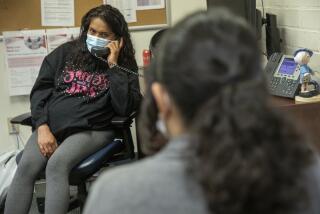Lawmakers Seek Wider Use of Volunteer Surgeons in Remote Areas
SACRAMENTO — For too long, Danielle Jones couldn’t smell a flower’s scent. She hadn’t the breath for junior high basketball, let alone her clarinet. She couldn’t breathe through her nose, plugged by overgrown adenoids. But her hometown of Redding is short of surgical specialists who could help--so for two painful years she waited.
“It was,” the 13-year-old girl said, “kind of like basically a nightmare.”
So it was with no small measure of victory Tuesday that Jones stepped up to a microphone at the state Capitol, pulled out her clarinet and warbled a few notes.
Jones got her surgery a few months ago thanks to a mercy mission by a team of Orange County doctors to help needy Northern California children. Now two state legislators want to spread that sort of good Samaritan effort to needy patients in California’s far reaches--many of them young, most of them poor, all of them hurting.
A bill by Assembly members George Runner Jr. (R-Lancaster) and Virginia Strom-Martin (D-Duncan Mills) would require the state health department to solicit medical specialists to volunteer their time to a statewide mercy mission program and set up a registry of participating doctors. Private funding would be solicited to help reimburse the physicians for travel costs to reach remote spots in the state.
The measure, AB 548, cleared its first hurdle Tuesday, winning approval in the Assembly Health Committee.
“We’re not a Third World country,” said Pamela Jones, Danielle’s mother. “We’re California. We do have a means to change this.”
California’s shortage of doctors is most acute among pediatric specialists, such as the ear, nose and throat surgeons that operated on her daughter and nearly 100 other children in Redding during two weekends of surgery last December and March.
Those surgeons are particularly hard to come by in far-flung areas. But shortages have also cropped up in more populous areas, including Los Angeles. The main problem, physicians say, is that payments from Medi-Cal and other government programs serving poor or chronically ill children have not kept pace with economic reality.
A squeeze on payments from private health plans in the state has only made matters worse, doctors say. Many pediatric surgeons and other specialists have left California or decline to set up practices here.
Communities in which the population may be too small to support certain specialty practices in the best of times are particularly hard hit.
“Our docs were literally unable to treat routine cases,” said Ann Murphy, medical director at Shasta County Health Center in Redding. “In essence, the doors were closed on our children.”
But the real fix, she and many other physicians say, will only come when the state agrees to boost its Medi-Cal reimbursements for treating the poor.
“We’re 50th out of 50 states,” said Jack Lewin, the California Medical Assn.’s chief executive. “If we don’t make some changes, in two years we’ll have a crisis akin to what we’re experiencing with energy. We’ll have rolling medical blackouts.”
The state’s energy crisis, however, looms large in any debate over boosting Medi-Cal payments. With electricity costs steadily draining the state’s coffers, the Legislature and Gov. Gray Davis may be in no mood to increase fees paid to doctors.
Moreover, some legislators believe that California has already given enough. Rates paid for treating youngsters with chronic or catastrophic diseases have grown substantially--by an average of 58% last year and 5% the year before.
Hence the need for mercy missions. Runner told his Assembly colleagues during Tuesday’s hearing on the bill that the proof was right before them.
He pointed out into the audience, at Danielle Jones, dark-haired and buoyant, clutching her clarinet.
“I think we all understand this is not going to solve California’s health access problems,” Runner said. “But here’s an example with Danielle. And it did solve her access problem.”
More to Read
Get the L.A. Times Politics newsletter
Deeply reported insights into legislation, politics and policy from Sacramento, Washington and beyond. In your inbox three times per week.
You may occasionally receive promotional content from the Los Angeles Times.










